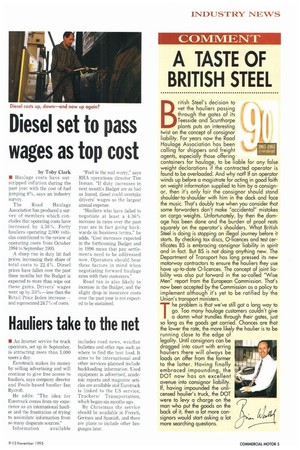A TASTE OF BRITISH STEEL
Page 7

If you've noticed an error in this article please click here to report it so we can fix it.
British Steel's decision to vet the hauliers passing through the gates of its Teesside and Scunthorpe plants puts an interesting twist on the concept of consignor liability. For years now the Road Haulage Association has been calling for shippers and freight agents, especially those offering containers for haulage, to be liable for any false weight declarations if the contracted operator is found to be overloaded. And why not? If an operator winds up before a magistrate for acting in good faith on weight information supplied to him by a consignor, then it's only fair the consignor should stand shoulder-to-shoulder with him in the dock and face the music. That's doubly true when you consider that some forwarders don't make "accidental" mistakes on cargo weights. Unfortunately, by then the damage has been done and the burden of proof rests squarely on the operator's shoulders. What British Steel is doing is stopping an illegal journey before it starts. By checking tax discs, 0-licences and test certificates BS is embracing consignor liability in spirit and in fact. But BS is not doing anything new. The Department of Transport has long pressed its new motorway contractors to ensure the hauliers they use have up-to-date 0-licences. The concept of joint liability was also put forward in the so-called "Wise Men" report from the European Commission. That's now been accepted by the Commission as a policy to implement although it's yet to be ratified by the Union's transport ministers. The problem is that we've still got a long way to go. Too many haulage customers couldn't give a damn what trundles through their gates, lust so long as the goods get carried. Chances are that the lower the rate, the more likely the haulier is to be
1905-1995 ..1.\\BERS41)
running close to the edge of legality. Until consignors can be dragged into court with erring hauliers there will always be loads on offer from the former to the latter. Having finally embraced impounding, the DOT now has an excellent avenue into consignor liability. If, having impounded the unlicensed haulier's truck, the DOT were to levy a charge on the man who put the goods on the back of it, then a lot more consignors would start asking a lot more searching questions.




















































































































